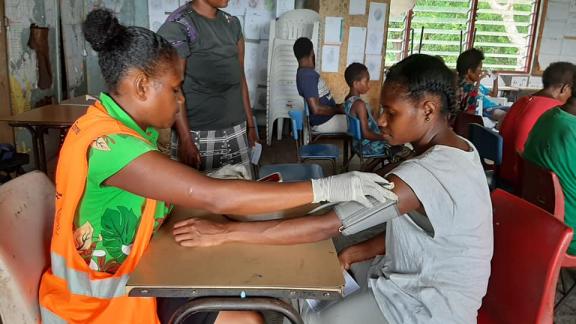According to the World Prison Brief's assessment in May 2022, Indonesia holds the 21st highest prison occupancy rate globally, with prisons and correctional institutions operating at a 208% occupancy rate. This statistic positions Indonesia as the fourth most overcrowded nation in Asia in terms of prison population density.
Overcrowding in prisons significantly amplifies the challenges those behind bars face and is further exacerbated by the absence of national-level regulations. Among the most vulnerable in these settings are women, girls, and young individuals, particularly those who are pregnant, nursing, or have specific healthcare needs. A lack of comprehensive healthcare services within these facilities leaves significant gaps in providing essential care.

The Indonesian Planned Parenthood Association (IPPA), an IPPF Member Association (MA), is leading the way in advancing sexual and reproductive health (SRH) services for incarcerated individuals across the country. IPPA has established strategic partnerships in more than ten regions, formalised through Memoranda of Understanding (MOUs). These collaborations include the IPPA Aceh Chapter, IPPA West Sumatera Chapter, and IPPA Riau Islands Chapter, among others, serving over 3000 clients.
These collaborations encompass a broad spectrum of services, including SRH education, HIV and STI testing, counselling, and ensuring access to affordable sanitary products and mental health support. IPPA also strongly emphasises providing contraceptive services, specialised counselling facilities, cancer screenings, and prenatal care. Through the RESPOND project, IPPA is dedicated to addressing the immediate SRH needs of incarcerated individuals while striving to establish a comprehensive framework that promotes their overall health and well-being.

Eko Maryadi, Executive Director of IPPA, highlights that with the generous support of the Department of Foreign Affairs and Trade (DFAT) Australia, reproductive health services have been expanded across 25 IPPA chapters. “Our collaboration with the Department of Corrections and local health agencies is focused on addressing the urgent SRH needs of marginalised communities, particularly women and young people in incarcerated settings. By bridging the gaps in the national SRHR landscape, we prioritise underserved groups and ensure they receive the essential health services they deserve,” he said.
Egy, who actively participated in an awareness session organised by IPPA at a Kalimantan Prison, shared her experience. “The cancer screening awareness session was eye-opening for me. It made me realise the importance of regular health check-ups. Getting my first pap smear highlighted how crucial it is for us in prison to access essential healthcare services. It's an integral part of our overall well-being."
Rita, who received medical care at a Jakarta prison, shared similar sentiments. "I used to dismiss my symptoms as minor discomfort. However, the information I received during an awareness session with the friendly IPPA medical team made me rethink this. It led to the discovery of uterine fibroids, and I promptly received treatment. Many of us lack information about our health. Focusing on education and raising awareness, particularly about conditions that often go unnoticed, can be life-changing," she said.
In a nation where the total prison population exceeds 270,000, the urgency of addressing the dire state of SRHR within Indonesia's overcrowded prisons cannot be overstated. Incarcerated individuals often fall through the cracks of the national healthcare system, making IPPA's services more crucial than ever.
For more information, contact:
Malarvili Meganathan,
Regional Communications, Voice & Media Advisor,
[email protected]
when









